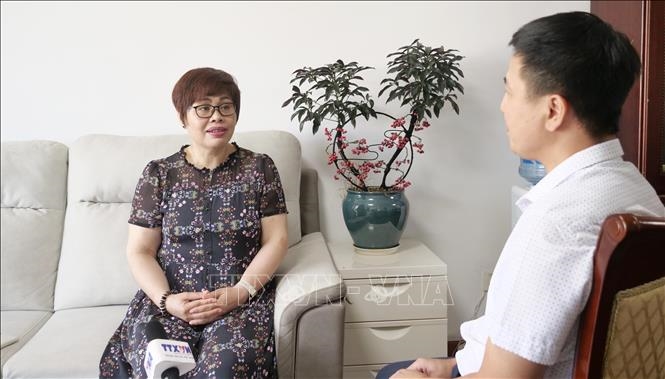Talking with Vietnam News Agency correspondents in Beijing on the occasion of the 80th anniversary of Vietnam’s August Revolution (August 19) and National Day (September 2), Pan hailed the CPV as the “vanguard” of national liberation movement that shattered colonial shackles and paved the way for independence.
Back when Vietnam was crushed under French rule and later Japanese occupation, the CPV, then known as the Indochinese Communist Party, mixed Marxism-Leninism with Vietnam’s realities. It rallied the nation under the banner of liberation, charting a revolutionary course to topple imperialism and feudalism while resisting colonial attempts at ideological control and national division, she recalled.
    |
 |
|
Prof. Pan Jin’e (left), a member of the Research Institute of Marxism under the Chinese Academy of Social Sciences and an expert on Vietnam |
The CPV was the “backbone” of Vietnam’s resistance against French and U.S. forces, she noted. Its leadership made Vietnam one of a few post-World War II nations in Asia, Africa, and Latin America to gain full independence through armed struggle.
Following national reunification, the CPV faced the enormous task of transforming from a revolutionary party into a ruling one. Through difficult exploration, it carved out a socialist development path tailored to Vietnam’s conditions.
According to her, the CPV spearheaded global integration amid reforms, acting as a core “architect” of institutional overhaul.
Another hallmark, Pan noted, has been the CPV’s focus on improving living standards. Investments in universal education, nationwide health insurance, and rural infrastructure have driven steady gains in quality of life, with Vietnam now ranking among the world’s happiest nations, according to global indices.
On top of that, the CPV has kept the nation united and stable, laying a rock-solid foundation for growth.
Guided by Marxism-Leninism and Ho Chi Minh's thought, and rooted in Vietnamese cultural traditions, the CPV has shaped a socialist value system that is uniquely Vietnam. It has inherited the national ideals of “independence, freedom, and happiness,” while imprinting them with contemporary socialist features, forging a unifying spirit across ethnic groups and social classes.
On the global stage, the CPV has led Vietnam’s engagement with the global socialist movement while continuously refining its theoretical and practical approaches.
Finally, the CPV has pursued and exercised international solidarity. On multilateral platforms such as BRICS and ASEAN, Vietnam, under the CPV’s leadership, has championed a fair and equitable world order, voicing the concerns of developing countries, and linking the socialist movement with cooperation in South-South cooperation, she concluded.
Source: VNA